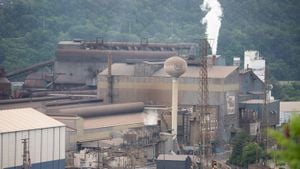The impact of former President Donald Trump's trade policies on global markets has been both controversial and extensive, reshaping the dynamics of international trade and economic relationships. Critics argue his focus on tariffs and protectionism has created uncertainty for businesses worldwide, raising questions about future trade agreements and market stability. Meanwhile, proponents of his strategies claim they are necessary measures to protect American manufacturing and combat unfair trade practices by other nations.
When Trump assumed office, he quickly took aim at trade deficits and what he characterized as unfair trade agreements. One of his first actions was to withdraw from the Trans-Pacific Partnership (TPP), effectively reshuffling the trade strategies of several nations. This move was seen as part of his broader agenda to prioritize American interests, yet it left many other countries scrambling to fill the void and solidify their own trade relationships.
Tariffs imposed on steel and aluminum imports were another cornerstone of Trump's trade approach, leading to retaliatory measures from countries like China, Canada, and Mexico. The intent behind these tariffs was clear: to bolster American manufacturing and reduce the trade imbalance. Yet, this strategy sparked widespread debate concerning job losses and price increases on consumer goods, leaving many economists worried about the long-term consequences.
China was at the heart of much of the trade contention. The trade war, ushered in by Trump's administration, led to tariffs on billions of dollars’ worth of goods on both sides. Supporters of Trump's aggressive stance lauded it as necessary to tackle intellectual property theft and unfair practices by China. Others feared it would not only harm U.S. consumers but also shake global markets by instigated competition among other nations.
International markets reacted strongly to the unpredictability surrounding Trump's trade decisions. Stock markets experienced significant swings as news of potential negotiations or new tariffs surfaced, showcasing how interconnected global economies really are. Businesses reliant on international supply chains found themselves grappling with rising costs and uncertainty about future operations.
The volatility prompted many companies to rethink their strategies, pushing some to diversify supply chains and explore new markets outside the United States. Some manufacturers even relocated portions of their operations back to the U.S. to mitigate the uncertainties tied to imported components.
Economic reports indicated mixed outcomes; some sectors benefited from tariffs as domestic production increased, particularly in steel and aluminum. Yet, U.S. farmers experienced hardships as retaliatory tariffs from other countries diminished their export markets, leading to cries for assistance from the government.
When assessing the overall impact, it’s apparent Trump's trade policies were not merely domestic decisions—they rippled through global markets and transformed alliances. For example, as U.S.-China relations soured, China looked to strengthen ties with Europe and other Southeast Asian nations, reshaping the global trade network.
Experts warn of potential long-term consequences from Trump's administration’s trade measures, highlighting the risk of delaying negotiations and damaging relationships with key trading partners. For countries seeking stability, the unpredictability stemming from American policies became concerning.
Looking back, the legacy of Trump's approach remains hotly debated. While certain sectors did experience benefits, the broader impact on international trade relationships might take longer to fully understand. The negotiations continue to be fraught with challenges as current leaders navigate the delicate balance between protecting national interests and maintaining cooperative global trade systems. The business world, adapting to new realities, is forced to remain agile as they grapple with the unpredictable influences of trade policies and the changing global market.



